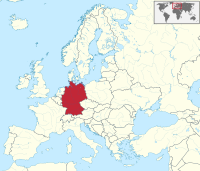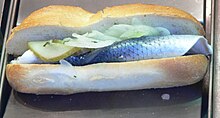Portal:Germany
Welcome to the Germany Portal!
Willkommen im Deutschland-Portal!

|

|

| |
Germany (German: Deutschland), officially the Federal Republic of Germany, is a country in Central and Western Europe, lying between the Baltic and North Seas to the north and the Alps to the south. It borders Denmark to the north, Poland and the Czech Republic to the east, Austria and Switzerland to the south, France to the southwest, and Luxembourg, Belgium and the Netherlands to the west.
Germany includes 16 constituent states, covers an area of 357,578 square kilometres (138,062 sq mi) and has a largely temperate seasonal climate. With 83 million inhabitants, it is the second most populous state of Europe after Russia, the most populous state lying entirely in Europe, as well as the most populous member state of the European Union. Germany is a very decentralized country. Its capital and largest metropolis is Berlin, while Frankfurt serves as its financial capital and has the country's busiest airport.
In 1871, Germany became a nation-state when most of the German states unified into the Prussian-dominated German Empire. After World War I and the Revolution of 1918–19, the empire was replaced by the parliamentary Weimar Republic. The Nazi seizure of power in 1933 led to World War II, and the Holocaust. After the end of World War II in Europe and a period of Allied occupation, two new German states were founded: West Germany, formed from the American, British, and French occupation zones, and East Germany, formed from the western part of the Soviet occupation zone, reduced by the newly established Oder-Neisse line. Following the Revolutions of 1989 that ended communist rule in Central and Eastern Europe, the country was reunified on 3 October 1990.
Today, Germany is a federal parliamentary republic led by a chancellor. It is a great power with a strong economy. The Federal Republic of Germany was a founding member of the European Economic Community in 1957 and the European Union in 1993. Read more...
Selected article

SMS Hindenburg was a battlecruiser of the German Kaiserliche Marine (Imperial Navy), the third ship of the Derfflinger class, built to a slightly modified design. She carried the same battery of eight 30.5 cm (12 in) guns, but in improved turrets that allowed them to fire further. The ship was also slightly larger and faster than her two sister ships. She was named in honor of Field Marshal Paul von Hindenburg, the victor of the Battle of Tannenberg and the Battle of the Masurian Lakes, as well as Supreme Commander of the German armies from 1916. The ship was the last capital ship of any type built for the German navy during World War I.
Hindenburg was commissioned late in the war and as a result had a brief service career. The ship took part in a handful of short fleet operations as the flagship of I Scouting Group in 1917–18, though saw no major action. The proposed final sortie of the fleet in the last weeks of the war came to nothing when the crews of the capital ships mutinied. Hindenburg was subsequently interned with the rest of the German battlecruisers at Scapa Flow in November 1918. Rear Admiral Ludwig von Reuter ordered the ships be scuttled on 21 June 1919. Hindenburg was the last of the ships to sink. She was raised in 1930 and broken up for scrap over the following two years. (Full article...)
Selected picture
Related portals
- Parent portals
- Regional
- History
 Holy Roman Empire (900–1806)
Holy Roman Empire (900–1806) East Germany (1949–1990)
East Germany (1949–1990)
- Neighbouring countries
Anniversaries for May 31

- 1740 — Death of "soldier king" Frederick William I of Prussia
- 1773 — Birth of poet Ludwig Tieck
- 1903 — VfB Leipzig becomes the first German football champion
- 1916 — German and British navies clash in the Battle of Jutland
- 1945 — Birth of movie director Rainer Werner Fassbinder
Did you know...
- ... that Samuel Kummer chose for his first recital as the organist of the restored Frauenkirche in Dresden music by Bach, Brahms, Max Reger, Louis Vierne, and himself?
- ... that the Lutheran St. Trinitatis in Wolfenbüttel, consecrated in 1719, is a Baroque church with a facade recalling that of a palace?
- ... that Romani Holocaust survivor Philomena Franz wrote about her deportation to Auschwitz, internment in Ravensbrück, escape from a camp near Wittenberge, and concealment by a farmer?
- ... that baritone Liviu Holender chose lieder by five composers whose music was banned by the Nazis—Schreker, Zemlinsky, Mahler, Korngold and Schönberg—for a recital at the Oper Frankfurt?
- ... that ancient humans cared for a 14,000-year-old puppy?
- ... that a reviewer described the approach of soprano Magdalena Hinterdobler to her role as Grete in Zemlinsky's Der Traumgörge as "bold" and "sassy"?
- ... that Thomas Mann insisted on omitting a passage on homoeroticism in the English translation of his work "On the German Republic"?
- ... that Heike Heubach became the first deaf member of the German Bundestag?
Selected cuisines, dishes and foods

A Fischbrötchen (listen) (pl. "Fischbrötchen", lit. fish bread) is a sandwich made with fish and other components such as fresh white or dried onions, pickles, remoulade, creamy horseradish sauce, ketchup, or cocktail sauce. It is commonly eaten in Northern Germany, due to the region's proximity to the North Sea and Baltic Sea.
A common preparation is made with bismarck herring or soused herring. Other varieties use Brathering, rollmops, European sprat, salmon, smoked Atlantic mackerel, fried Atlantic cod, and other fish varieties (e.g., fish burgers). Prawns are sometimes used, as are various other species of food fish. Fischbrötchen are commonly served at fast food stands or take-out restaurants. (Full article...)Topics
Categories
Things you can do

A list of articles needing cleanup associated with this project is available. See also the tool's wiki page and the index of WikiProjects.
Here are some tasks you can do. Please remove completed tasks from the list.
- Requests: Columbiahalle, German Archaeological Institute at Rome, Deutsche Familienversicherung, Dietlof von Arnim-Boitzenburg, Hennes Bender, Georg Bernhard (1875–1944), Eduard Georg von Bethusy-Huc, Rolf Brandt (1886–1953), Jan Philipp Burgard, Georg Arbogast von und zu Franckenstein, Ferdinand Heribert von Galen, Herbert Helmrich, Monty Jacobs (1875–1945), Hans Katzer, Siegfried Kauder, Heide Keller, Matze Knop, Isidor Levy (1852–1929), Markus Löning, Anke Plättner, Hans Heinrich X. Fürst von Pless, Gerd Poppe, Victor-Emanuel Preusker, Hans Sauer (inventor), Franz August Schenk von Stauffenberg, Paul Schlesinger (1878-1928),Oscar Schneider, Hajo Schumacher, Otto Theodor von Seydewitz, Dorothea Siems, Werner Sonne, Anton Stark, Udo zu Stolberg-Wernigerode, Christoph Strässer, Torsten Sträter, Joseph von Utzschneider, Jürgen Wieshoff, Hans Wilhelmi,
- Unreferenced: Unreferenced BLPs, Bundesautobahn 93, Benjamin Trinks, Steeler (German band), Amelie Beese, Zoologisches Museum in Kiel, Emil Krebs, Prussian semaphore system, Partenstein, Peter Krieg, Porsche 597, Christa Bauch, Curt Cress, Stefan Beuse
- Cleanup: 53541 issues in total as of 2024-03-03
- Translate: Articles needing translation from German Wikipedia
- Stubs: Albersdorf, Thuringia, Ingo Friedrich, Berndt Seite, Federal Social Court; 107 articles in Category:German MEP stubs
- Update: Deutsches Wörterbuch
- Portal maintenance: Update News, Did you know, announcements and the todo list
- Orphans:
Orphaned articles in Germany

- Photo: Take/Add requested photographs
- Expression error: Unrecognized punctuation character ",".
Associated Wikimedia
The following Wikimedia Foundation sister projects provide more on this subject:
-
Commons
Free media repository -
Wikibooks
Free textbooks and manuals -
Wikidata
Free knowledge base -
Wikinews
Free-content news -
Wikiquote
Collection of quotations -
Wikisource
Free-content library -
Wikiversity
Free learning tools -
Wikivoyage
Free travel guide -
Wiktionary
Dictionary and thesaurus













































